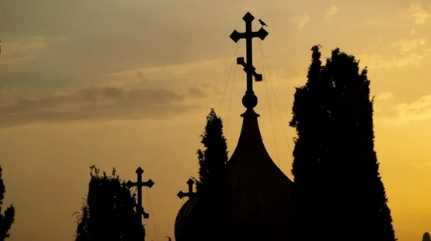
30 March 2022; MEMO: Palestinian Greek Orthodox Church leaders have denounced the "illegal" takeover of church property in occupied East Jerusalem by Israeli "extremists", highlighting once the again the "threat of extinction" from "radical" Israeli groups which was issued by Christian groups earlier this year.
The latest property in question is a Jerusalem hostel operated by Palestinians. On Sunday a notorious settler organisation, Ateret Cohanim, broke into the hostel as well as a nearby money exchange shop. The extremist settlers received Israeli police protection despite possessing no eviction notice.
Ateret Cohanim's stated goal is the creation of a Jewish majority in the occupied Old City and Arab neighbourhoods in East Jerusalem. It works to "Judaise" East Jerusalem to achieve Jewish supremacy, which is a form of ethnic cleansing. The organisation does this by purchasing properties through front companies and then moving Jewish settlers into them.
"Acting in this illegally aggressive manner against a known Christian property and an Arab business — particularly ahead of Easter and Ramadan — could likely ignite local hostilities," the Church said on Tuesday, condemning the takeover. "The patriarch requests that the police act to evict Ateret Cohanim… until the ongoing legal proceedings conclude and are finalised."
Medhat Deeba, an attorney representing the Palestinian Qiresh family that runs the hostel, is reported as saying that members of the Israeli organisation had taken over one of two sections of the property. "They didn't give the residents an eviction notice, and they broke in illegally," he explained.
The hostel is in the Old City, which Israel seized in 1967 and later annexed in a move that has never been recognised by most of the international community. Israeli law allows Jewish citizens to "reclaim" property owned by Jews in occupied East Jerusalem prior to Israel's creation in 1948, but Palestinian Arab citizens do not have recourse to the same process. This practice is cited by human rights groups as an example of one of the many apartheid practices of the occupation state.
The latest dispute is related to the sale of church property in 2004, which the Greek Orthodox Patriarchate in Jerusalem rejected, allegedly because Ateret Cohanim paid a bribe to the then Greek Patriarch Irenaios to finalise the deal. When the sale was made public in 2005, Irenaios was forced from office by church officials and replaced by the current Patriarch, Theophilos III. His successor has since waged a legal campaign to see the property returned to the church, arguing that the earlier transactions were the result of corruption and that a bribe was paid by Ateret Cohanim to employees of the Patriarchate to advance the sales.
This weekend's takeover of church property by the far-right settler organisation is a further sign of the "threat of extinction" facing Palestinian Christians from "radical" Israeli groups. This warning was issued earlier this year by Francesco Patton, the Catholic Church's Custos of the Holy Land. The Archbishop of Canterbury, Justin Welby, echoed the message about the plight of Palestinian Christians during a Christmas message. When you speak to Palestinian Christians in Jerusalem today, you will often hear them saying, "In 15 years' time, there'll be none of us left," said Welby in a related article.
Prior to Israel's creation in 1948, Palestinian Christians were the second largest religious community, making up more than eleven per cent of the total population. The waves of ethnic cleansing which the Palestinians call the Nakba ("Catastrophe") has reduced their number to its present "extinction" level.
Israel's violent capture, illegal annexation and military occupation of Jerusalem has accelerated the flight of Palestinian Christians from their country. Human rights groups have described Israel's rule over the territory as a form of apartheid, under which Christian Palestinians are also treated like second- and third-class citizens.




